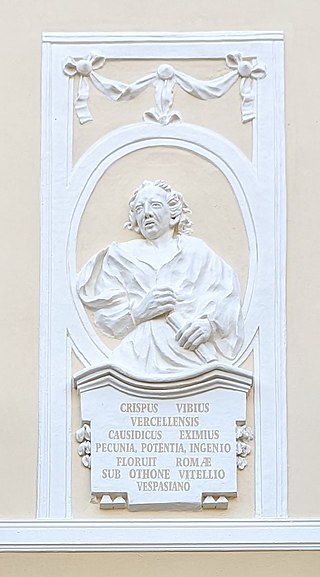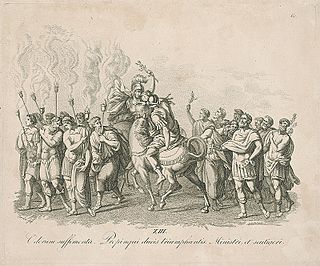Related Research Articles

Galba was Roman emperor, ruling for 7 months from 8 June AD 68 to 15 January 69. He was the first emperor in the Year of the Four Emperors and assumed the throne following Emperor Nero's suicide.

Otho was Roman emperor, ruling for three months from 15 January to 16 April 69. He was the second emperor of the Year of the Four Emperors.

The Year of the Four Emperors, AD 69, was the first civil war of the Roman Empire, during which four emperors ruled in succession: Galba, Otho, Vitellius, and Vespasian. It is considered an important interval, marking the transition from the Julio-Claudians, the first imperial dynasty, to the Flavian dynasty. The period witnessed several rebellions and claimants, with shifting allegiances and widespread turmoil in Rome and the provinces.
Marcus Trebellius Maximus was a Roman senator active during the reign of Nero. He was suffect consul for the nundinium of May to June 55 AD as the colleague of Seneca the Younger, replacing Publius Cornelius Dolabella.

Lucius Salvius Otho was the father of the Roman emperor Otho. He was born of a distinguished and well-connected family on his mother's side. His close friendship with Tiberius, and physical similarity to him, led to rumours that he was Tiberius's son.
Titus Flavius Sabinus was a Roman senator who was active in the first century AD. He was twice consul suffectus, first in the nundinium of April through June of 69 with his brother Gnaeus Arulenus Caelius Sabinus, and again in May and June of 72 as the colleague of Gaius Licinius Mucianus.
Lucius Salvius Otho Titianus was the elder brother of the Roman Emperor Otho. As a Roman senator, he was consul in the year 52 as the colleague of Faustus Cornelius Sulla Felix, and appointed consul as his brother's colleague for the period from Galba's murder to the end of February. When Otho left Rome to halt the advance of Vitellius into Italy, he put the daily imperial responsibilities in the hands of Titianus. Subsequently, Titianus was appointed generalissimo in charge of the war by Otho and was present at the First Battle of Bedriacum.

Lucius Junius Quintus Vibius Crispus was a Roman senator and amicus or companion of the Emperors, known for his wit. He was a three-time suffect consul.
Quintus Sulpicius Camerinus Peticus was a Roman senator during the reign of Nero.
Pompeius Silvanus, fully Marcus Pompeius Silvanus Staberius Flavinus or Flavianus, was a Roman senator who was consul twice.
Tiberius Julius Candidus Marius Celsus was a Roman senator who lived during the Flavian dynasty. Contemporary sources, such as the Fasti Ostienses, the Acta Arvalia and a letter of Pliny the Younger, refer to him as Tiberius Julius Candidus. He was twice consul.
Lucius Venuleius Montanus Apronianus was a Roman senator of the first century. He was suffect consul for the nundinium of January to April AD 92 with Qunintus Volusius Saturninus, replacing the emperor Domitian.
Lucius Neratius Priscus was a Roman Senator and leading jurist, serving for a time as the head of the Proculeian school. He was suffect consul in the nundinium of May–June 97 as the colleague of Marcus Annius Verus.
Gaius Cilnius Proculus was a Roman senator active during the reign of Domitian. He was suffect consul for the nundinium September–December AD 87 with Lucius Neratius Priscus as his colleague. It is unknown how or if Proculus is related to the better-known Gaius Cilnius Maecenas. Proculus is known only through surviving inscriptions.

Quintus Pomponius Rufus was a Roman senator active in the imperial service; he was governor during the reigns of the emperors Domitian and Trajan. Rufus was also suffect consul for the nundinium September-December AD 95 as the colleague of Lucius Baebius Tullus. Pomponius Rufus is known primarily from inscriptions.

Lucius Valerius Propinquus was a Roman senator active in the second century AD. He was suffect consul who replaced the ordinary consul Marcus Annius Verus and was the colleague of the other ordinary consul, Gaius Eggius Ambibulus, for the remainder of the first nundinium of 126.
Aulus Ducenius Geminus was a Roman senator active in the first century AD. Geminus is best known as Galba's appointment as Urban prefect of Rome during the Year of Four Emperors.
Appius Annius Gallus was a Roman senator and general who flourished during the first century. He held the office of suffect consul in 67 with Lucius Verulanus Severus as his colleague. The suffect consul of 67 is commonly identified as the general who supported Otho during the Year of the Four Emperors.
Publius Cornelius Scipio Asiaticus was a Roman senator active during the Principate. He was suffect consul in the nundinium of September to December 68, as the colleague of Gaius Bellicius Natalis. Both Asiaticus and Bellicius Natalis were picked to be suffect consuls by emperor Galba.
Tiberius Julius Candidus Celsus was a Roman senator, who was active during the reign of the emperors Hadrian and Antoninus Pius. Coins of the town of Harpasa bear the image of the young Marcus Aurelius on the obverse, and the name "Candidus Celsus" on the reverse, attesting that Celsus was proconsular governor of the public province of Asia in the reign of Marcus. Ronald Syme dated his tenure as governor more narrowly to AD 144/145, which would date his suffect consulate to a nundinium around the year 129.
References
- ↑ G.B. Townend, "The Consuls of A. D. 69/70", American Journal of Philology, 83 (1962), pp. 113-129
- ↑ Syme, "More Narbonensian Senators", Zeitschrift für Papyrologie und Epigraphik , 65 (1986), p. 9
- ↑ CIL XII, 3252 = ILS 697
- ↑ Tacitus, Annales XV.25.3
- ↑ Gwyn Morgan, 69 A.D.: The year of Four Emperors (Oxford: University Press, 2006), p. 60
- ↑ Morgan, 69 A.D., p. 67
- ↑ Morgan, 69 A.D., p. 96
- ↑ Morgan, 69 A.D., pp. 101f
- ↑ Morgan, 69 A.D., pp. 119
- ↑ Morgan, 69 A.D., pp. 124-130
- ↑ Morgan, 69 A.D., p. 132
- ↑ Morgan, 69 A.D., pp. 137f
- ↑ Morgan, 69 A.D., pp. 150f
- ↑ Werner Eck, "Jahres- und Provinzialfasten der senatorischen Statthalter von 69/70 bis 138/139", Chiron , 12 (1982), pp. 287-291
- 1 2 Syme, "Governors dying in Syria", Zeitschrift für Papyrologie und Epigraphik, 41 (1981), pp. 133f
- ↑ Eck, "Jahres- und Provinzialfasten", pp. 291-293